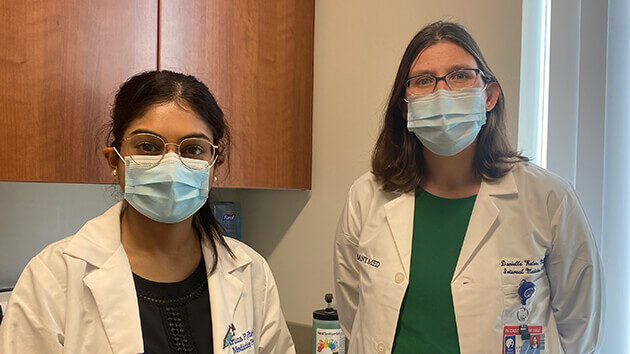Albany Med Experts Provide Back-To-School Tips for Parents

The start of a new school year has many parents and families navigating uncertain waters. Due to continuing Covid-19 concerns, schools are updating plans based off state and federal guidance and distributing updated information to families. Questions still linger about how to ensure student health and safety.
We asked Danielle Wales, MD, Associate Professor of Internal Medicine and Pediatrics, along with Aruna Phekoo, MD, Internal Medicine/Pediatrics Resident, to weigh in on some of the most asked questions from parents ahead of the start of school.
Q: What are simple steps parents can take to help their children stay healthy during the upcoming school year?
Dr. Phekoo: The first thing is to get vaccinated for Covid – both parents and children over the age of 12. If a child is under the age of 12 or not vaccinated, teach them about the proper way to wear a mask. Teach them about proper hand hygiene such as how long to wash their hands and what type of hand sanitizer to use.
It’s important to remind children that whenever possible, they should practice social distancing.
Q: Along with a child’s physical health, how much focus should be placed on their mental health?
Dr. Phekoo: It’s important to talk with your children about what’s going on regarding Covid-19. We have seen an increase in cases of anxiety and depression among children and this pandemic has impacted everyone. Be sure that you explain why we’re wearing masks and why we’re being careful but try to do so in a way that won’t cause more anxiety.
Q: There’s been so much unpredictability during the Covid-19 pandemic. Is there any way for parents to be prepared for whatever may come next with the virus?
Dr. Wales: We’re hoping to get more data soon on the safety and effectiveness of the Covid-19 vaccine on children under the age of 12. We’re hoping that it will show to be safe and effective. Until then it’s important for parents to be prepared if your child needs to be tested for Covid because of a potential exposure. If a child is feeling symptoms such as a fever, respiratory problems, stomach troubles or any other signs of illness, call their pediatrician and discuss testing for Covid.
Q: Are there other preventive measures that parents can take to protect their child’s overall health?
Dr. Phekoo: Parents should make sure children are getting all other vaccines as scheduled. A lot of routine vaccinations were delayed in 2020 due to concerns about Covid-19 and coming into their pediatrician’s office. Without these other vaccines, your child can be at risk for many other illnesses.
If you aren’t sure what vaccines your child needs, you can always ask their pediatrician. The Centers for Disease Control and Prevention (CDC) and the American Academy of Pediatrics also have great resources for parents. And, if you missed vaccines or are behind, work with your pediatrician to come up with a plan to make sure your child gets back on schedule.
Q: You mentioned being back together more with the start of the school year. Should parents consider limiting their child’s extracurricular activities in an effort to keep them healthy?
Dr. Wales: The risk of getting Covid from outdoor activities is pretty low assuming that there’s not a lot of people gathered together. Kids should be encouraged to get outside for activities. We want kids to be active and they should be able to be comfortable being active outside. Exercise, particularly outdoor, is great for not only your cardiovascular health but your mental health as well. And we encourage parents to participate with their children in these outdoor activities whenever possible.
Q: Do you have advice for parents who are looking to stay informed?
Dr. Phekoo: Make sure that you’re using reputable sources to find information. Refer to the Centers for Disease Control and Prevention website for the most up-to-date guidelines. It’s important to stay up- to-date and that website will give you the information you need.
Dr. Wales:Things continue to change, and it’s important to know that good science means that our knowledge grows – and guidance does change – as we learn new information.
Q: Do you have any final tips on ways to make sure your child is ready for the school year?
Dr. Wales: Kids are naturally curious, and often are naturally smarter than we give them credit for. Talk with their pediatrician and use the CDC and AAP resources we mentioned.
It’s also important to make sure that your child is following healthy habits such as eating meals at consistent times and within nutrition requirements and going to bed on time. This should be not only during the school week but on the weekends to maintain a healthy lifestyle going forward.